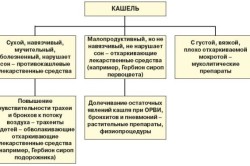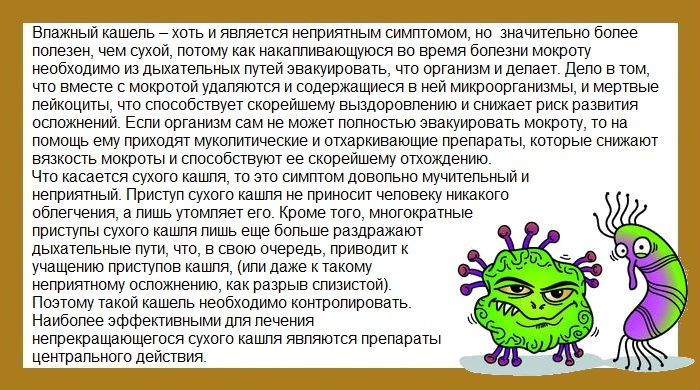Children tend to get sick, and every mother sooner or later faces the problem of a protracted, incessant cough in her child. But not all parents know that it is not always a symptom of a cold; its causes and consequences can be much more serious and even dangerous.
Causes of persistent cough in children
Cough is a reflex defense of the body that helps clear the airways of irritants, foreign objects and mucus. But if a child’s dry cough does not stop for more than three weeks, this is an alarming signal indicating the need for a thorough examination.
In most cases, cough appears as a result of colds, as well as bacterial and viral infections. However, there are a number of less common causes of prolonged dry cough in children:
- The causes of cough can be some diseases of the gastrointestinal tract ( gastrointestinal tract), as a result of which irritation of the throat mucosa will be provoked by gastric contents. Often, attacks of such a cough are accompanied by vomiting or excessive salivation and occur during or immediately after eating.
- Attacks of dry cough that occur in a child only during sleep (in a horizontal position) may indicate heart failure.
- Frequent obsessive coughing, accompanied by breathing problems and chest pain, may indicate the presence of a foreign body in the baby's respiratory tract.
- A rare but protracted dry cough without fever is a common sign of helminthiasis and helminthic infestations in a child.
- The cause of a long, debilitating dry cough in a child may be tuberculosis, the presence of tumors and neoplasms in the respiratory tract.
- Prolonged coughing, either dry or wet, with an increase in body temperature can be a sign of pleurisy, tracheitis, pharyngitis and measles.
- If a child constantly coughs, a hoarse whistling note appears in his breath, but the temperature does not rise, the doctor may suspect the presence of allergies or bronchial asthma.
- Constant dryness in the absence of any other symptoms may be a consequence of disseminated processes in the lungs and bronchi, increased lymph nodes mediastinum, edema of the respiratory tract, compression by an aortic aneurysm.
The presence of a persistent dry cough in a child is an alarming symptom that requires proper diagnosis and timely treatment. Some diseases do not forgive us mistakes and delays, leading to serious complications and sad consequences.
At the doctor
Only a qualified specialist can accurately determine the cause of a depressing dry cough in children. You should not torment your baby with exhausting but ineffective self-medication, this can cause irreparable harm to his health.

When going to see a doctor, parents need to remember any changes in the child’s behavior and condition over the past Lately. Even minor little things will help a correct diagnosis, and you should definitely report them to your doctor.
After general examination, the specialist may prescribe additional examination methods, including:
- Blood test or
- X-ray of the baby's lungs
- Tomography of the thoracic organs
- Spirography
If there are no pathologies of the respiratory system, a more thorough examination is carried out:
- Immunological studies
- Tests for worm eggs, staphylococcus
- Tracheobronchoscopy
- Esophagogastroduodenoscopy
- ECG or ultrasound of the heart
- Ultrasound of the abdominal organs
- Examination by an allergist
Caring mother and experienced doctor- this is an excellent tandem that protects the baby’s health, and solving a problem alone is always more difficult and takes longer. Having identified real reasons child cough, the doctor will prescribe the most effective treatment, taking into account the age and other characteristics of the body of your little patient.
Traditional treatment
Modern medicine offers a huge selection of cough medications for children. These medications are divided into four main groups:
- Mucolytic agents that help thin sputum: Lazolvan, Bromhexine, ACC, Ambrobene, etc.
- drugs whose action is aimed at removing mucus from the baby’s respiratory tract: Pertussin, Gedelix, Linex, Doctor Mom.

- Antitussives that act on the brain to reduce the cough reflex: Tusuprex, Libexin, Codeine, etc. They are used strictly as prescribed by a doctor.
- Combined drugs: Bronchosan, Ascoril, Broncholitin, etc.
- and corticosteroids should also be calculated and prescribed exclusively by a specialist, as they have many side effects, and sometimes can do more harm than help.
All pediatricians recommend creating the most comfortable conditions for a child suffering from a dry, incessant cough: a clean room and moist, fresh air. Even in past centuries, healers advised people with weak lungs to “go to the waters,” as the humid sea air contributed to their health and well-being.
Another helpful advice: plenty of warm drink, thinning the blood and, accordingly, phlegm. Moreover, an increase in the volume of fluid consumed will lead to more frequent urination, which means that the sick child’s body will quickly cleanse itself of viruses, bacteria and other irritants.
Famous Ukrainian pediatrician E.O. Komarovsky believes that even the most expensive expectorant will not be more effective than “a pot of compote and a well-ventilated room.”
You should be aware that at the very beginning of treatment with mucolytics, the intensity of the cough may increase. As the phlegm thins, there will be more mucus, and the body will work harder to get rid of it. And of course, before using any children's drug, you must read the instructions and make sure that the product will not harm your baby.
Traditional medicine methods
Along with drug treatment Mustard plasters, rubbing, and inhalations are widely used. However, these procedures are permissible only in the absence of an increase in body temperature and allergic reactions the baby on the components used. Don't forget about the good old methods traditional medicine. The most effective of them:
- In a clean bowl, mix 3 tbsp. l. warm water(approximately 40 degrees), 1 tbsp. honey with beebread and 1 tbsp. grated cranberries. Give this mixture to the child 1 tsp. Like syrup, it tastes good, but it is not recommended to drink it with water.
- Apply a thin layer of honey to a cabbage leaf, apply it to the baby's chest and secure with a wide bandage. This homemade mustard plaster can be left on your chest until the morning.
- It will be useful to breathe over steaming boiled potatoes.
- For dry coughs, herbal decoctions are effective: calendula, linden, chamomile and pine buds. You can make a proportional collection and brew 1 tbsp. l. per glass of water. If the baby doesn’t like the taste, you can add a little honey or.
- 1 tbsp. pour marshmallow root with a glass of chilled boiled water and leave for at least an hour. Strain and sweeten with honey or sugar if desired. Children under three years of age can be given a teaspoon every two hours.
When choosing a folk remedy, it is also necessary to take into account the child’s condition, his individual and age characteristics. A course of treatment folk remedies is no more than two weeks, if during this time the baby’s condition does not improve, you need to consult a doctor for new advice and recommendations.
While watching the video you will learn about the treatment of dry cough.
The main task of the parents of a sick child is to create all the conditions for recovery: timely health care, emotional and physical peace, fresh humidified air, clean dry linen, etc. The most effective medicine for a baby is the feeling of mother's love and care.
- Causes and treatment of persistent cough
- Causes and treatment of wet cough
- Causes of wet cough
A persistent cough may be a symptom of allergies or acute bronchitis. It is this persistent cough that can cause stopping or difficulty breathing. In this case, you need to urgently make an appointment with a doctor, because self-medication of symptoms will not cure the disease itself. You need to undergo a comprehensive diagnosis of your body. This will help the specialist understand the root cause of this symptom.

Coughing is a process of forced exhalation of air through the mouth, which is caused by involuntary contraction of a number of muscles of the respiratory system. This mainly occurs due to irritation of delicate receptors. He plays a big role for human body. Due to it, the body is cleansed of foreign substances, and a cough also warns a person about a violation of the respiratory tract.
If you have a persistent dry cough with sputum production, it will be considered unproductive. For many people, before a cough appears, it first begins with just a sore throat.
If you cannot determine the underlying cause, then it may be a symptom of some other disease that is related to the respiratory tract. This disease can occur in both closed and open forms.
An incessant cough occurs in a person as a response to external irritants. For example, when dust particles enter the lungs, the human body begins to react to the irritant.
Causes and treatment of persistent cough
Why is it so important to undergo treatment for a constant, incessant cough? If left untreated, over time the bronchi become filled with microbes and their waste products. As a result, a person may develop pneumonia. In medicine, there are 3 types of cough:
- dry;
- with sputum;
- night and morning.
The latter type is divided, in turn, into strong and weak depending on its intensity.
The sources of dryness can be different. This disease is mainly associated with respiratory system person. An inflammatory process occurs in the upper respiratory tract, viruses and pathogenic bacteria multiply. If a person has a strong the immune system, then in this case the body is able to cope with the disease on its own. And if, on the contrary, it is weakened, then antibiotics and antiviral drugs help patients.
If you have a severe cold, you should definitely consult a specialist, because recently doctors have observed various complications after the illness in patients suffering from the flu or a cold accompanied by a dry cough.
If you are sick with ARVI, influenza or other infectious disease, which for a long time accompanied by a dry cough, this may be due to the following reasons:
- The immune system is weakened.
- Smoking, alcohol, too dry air in the house, insufficient fluid content in the body, etc.
- Complications of other viral diseases.
 Here is a list of some diseases that cause a dry, prolonged cough:
Here is a list of some diseases that cause a dry, prolonged cough:
- pneumonia;
- bronchitis;
- whooping cough;
- measles;
- false croup
The latter diseases can cause severe coughing in children. Then you should take the appropriate medications, for example, Sinekod, Libexin, Bronholitin, etc.
An adult may have a dry, persistent cough if he is sick with tuberculosis. A severe cough may be one of the first symptoms of cancer.
Allergic reactions, bronchial asthma and cardiovascular diseases may also be accompanied by a persistent cough.
The main sources of persistent cough:
- Smoker's bronchitis.
- Benign tumor.
- Malfunctions of the cardiovascular system.
- Lung problems.
In order to prevent the appearance of a dry cough, it is necessary to increase the air humidity in the room, drink at least 2 liters of water per day, quit smoking or reduce the number of cigarettes smoked per day, do not often spray air freshener in the apartment and do wet cleaning in the rooms every day .
 To treat a long-term symptom, there are many medications available to help get rid of it. They influence nervous system, thereby reducing the cough reflex.
To treat a long-term symptom, there are many medications available to help get rid of it. They influence nervous system, thereby reducing the cough reflex.
Medicines such as Oxeladin and Codeine will help get rid of a cough, but by acting on the medulla oblongata, the drugs can cause drowsiness in a person, and in some cases even addiction.
Only one medicine does not have side effects- This is Dextromethorphan. Remember that before buying medicines at the pharmacy, you need to consult a specialist, and do not self-medicate.
Colds for many people are long-lasting and severe. The cough can drag on for many months and become chronic. Viruses mutate because people consume too much medicines who are not able to cope with what has entered the body and does not allow it to function normally.
When the mucous membrane of the bronchi and larynx is irritated, dry cough. The brain receives a signal that there is a foreign body in the airways that needs to be eliminated. Chronic cough bothers people prone to allergies and suffering from bronchial asthma.
There is no coughing because there is no mucus or foreign bodies in the respiratory tract. There is only irritation of the mucous membrane. A dry cough often occurs due to influenza, ARVI and other diseases that drag on for too long. A cold is not always the cause of a cough; it can bother a person due to problems with the heart, stomach, worms, stress, or poor ecology.
Incessant cough, only a doctor knows what to do. After all, a cough can have different etiologies, so it needs to be treated in different ways. What is acceptable in one case is completely unacceptable in another.
What can a person do himself to make his plight a little easier? First, you need to install a humidifier in the apartment and make sure that the air in the room where the patient is is not too dry. Secondly, you need to carry out wet cleaning as often as possible; dust and smoke in the apartment provoke new coughing attacks. Thirdly, the sick person needs to be provided with a calm environment, without conflicts, scandals and psychological pressure.
How to stop a persistent cough?
In order to get rid of a cough, you need to take medications prescribed by your doctor. Traditional medicine can be used without any restrictions and prescribed to yourself.
How to stop persistent cough? You need to buy cranberries and honey with beebread, mix the ingredients and pour them warm water, in a 1:1 ratio. Take one tablespoon when coughing. It is advisable not to drink water; you can drink water only after fifteen minutes. This medicine is suitable only for those who are not allergic to honey.
Night cough easily removed with warm herbal decoction. You need to prepare it in advance by mixing linden, calendula, chamomile, spruce needles and pine buds. This mixture is poured into a thermos and filled with boiling water.
Persistent cough in an adult
When you cough, you need to take a saline solution once a day. For ¼ glass of water take 1/5 teaspoon of salt. Before and after adoption saline solution, you must definitely drink boiled water. Salt relieves coughing and has an anti-inflammatory effect.
Continuous cough in an adult can be stopped with cedar oil. This oil should be taken on an empty stomach and not washed down with water. Cedar oil is rich in microelements, vitamins, proteins and amino acids; it relieves irritation, inflammation and is good for coughs.
In order to stop coughing, you need to finely chop the onion, put it in a plate and breathe with eyes closed. Here it is important to ensure that the smell of onions does not take your breath away and regulate its quantity. A person inhales through his mouth, holds his breath for fifteen seconds and exhales through his nose. You need to breathe slowly so that the nasopharynx receives maximum amount phytoncides.
During any illness, you need to drink as much as possible. Drinking promotes a speedy recovery as it prevents dehydration. You need to drink at least two liters of water per day.

The child has a persistent cough
After a cold, residual effects often occur that can manifest themselves long time. If a child has a persistent cough, then most likely an infection has settled in his respiratory tract and is not going to go away without a fight. If the cough does not go away for more than two weeks, you should go to the doctor. Further self-medication is unacceptable.
Pneumocystis, mixed infections, fungi and bacteria provoke the occurrence of lingering cough. In order for the treatment to be correct and quick, you need to show the child a good specialist, or better yet several.
The child has a dry, persistent cough
A cough can begin either at the beginning or at the end of the illness. At the beginning of the disease, it indicates that some kind of infection has entered the respiratory tract, and at the end, it indicates that the disease has not been completely cured. Sinusitis, pharyngitis, laryngitis, tonsillitis and ARVI - all these diseases are extremely unpleasant, it is difficult to get rid of them, since they also leave a long tail of consequences.
The child is dry a persistent cough that becomes watery over time. You just need to help the body and make sputum appear and begin to leave. Laryngitis is characterized by a barking cough and a hoarse voice. In order to exclude the presence of such serious diseases as bronchitis, tuberculosis and pneumonia, you need to show your child to a doctor.
A constant dry cough should alert every person. After all, this protective reaction of the body does not simply arise. In this case, reasons such as severe illness or an allergic condition can be considered. Most often, people experience severe advanced diseases, when a person coughs for a long time and cannot even clear his throat.
In any case, to avoid this, a lingering cough requires appropriate attention and certain actions. Treatment should be prescribed by a doctor after examination. Doctors categorically do not recommend self-medication without knowing all the causes of a dry, lingering cough, especially if the symptom is really dry and long-lasting. Especially during the cold season, more and more queries appear on the Internet such as: “I can’t clear my throat, what should I do?” or “I can’t cure a dry cough” or, much better, “I can give you my cough recipe.”
As for home recipes, they generally cannot be trusted, because each person may have an individual reason for one or another symptom. Therefore, it is better, if possible, to consult a doctor and only then take treatment measures.
Non-infectious causes
A persistent, lingering dry cough can occur both with infectious motives and in their absence. For example, these could be:
- the presence of rhinitis, sinusitis, and sinusitis can cause the deposition of excess mucus in the lungs. It appears there due to constant involuntary flow from the nasal passages;
- Heartburn is also a common cause. Most often this happens in an adult, especially from excessive consumption of various spices and sauces;
- an allergic reaction of the body to certain irritants - the reasons for this can be more than different, so in this case the cough will not only be prolonged, but also paroxysmal;
- Taking certain medicines, without which a person cannot live. In this case, replacement is necessary;
- constant or long exposure to polluted air or harmful work in chemical plants. It tends to be more common in adults than in children;
- chronic cardiovascular diseases;
- Compression of the airways quickly provokes a lingering dry cough. This occurs in the presence of certain characteristic tumors or due to mechanical trauma.
Possible infectious causes
 You can cough for a long time not only for simpler reasons, but also because serious illnesses. It is a dry, incessant cough that most often becomes a consequence of the presence of an advanced serious infectious disease. Treatment will require appropriate efforts and certain actions. So these could be:
You can cough for a long time not only for simpler reasons, but also because serious illnesses. It is a dry, incessant cough that most often becomes a consequence of the presence of an advanced serious infectious disease. Treatment will require appropriate efforts and certain actions. So these could be:
- respiratory diseases such as pneumonia or bronchitis;
- helminthic infestations - do not pose a serious danger, but treatment is still necessary;
- whooping cough is a common and characteristic cause of a person coughing for a long time without any sputum production;
- the presence of tuberculosis infection - in this case, the symptom can last up to six months and if appropriate treatment measures are not taken, the person may die. This disease is more than serious.
If after a certain time the cough still does not go away, you should consult a doctor and no longer self-medicate. After all, it can be a manifestation of a serious illness. If, however, during the examination no serious dangers were identified, and the symptom does not go away, then you need to contact an allergist. Perhaps a dry cough is a sign of an allergic condition in the body. In this case, treatment should be prescribed only after the allergen to which the body reacts negatively is known.
On this moment V modern medicine there are quite a lot different ways treatment and prevention of allergic cough. So there is no need to be afraid to seek help from the hospital. After special tests, there is a high probability that a harmful allergen will still be identified. Then the allergic condition of the body will improve. Right choice antihistamines will do the trick.
Any disease must be treated promptly and in no case left unattended. The same applies to such a persistent and widespread problem as the presence of a cough. There is no need to think that if his symptoms are mild, then everything will pass.
Sometimes complications occur much more often and faster than we have time to feel anything. If even the slightest sign of illness does not go away, it is better to immediately consult a doctor. The most important thing is to monitor children, because their body is in the stage of formation and development, and therefore requires special attention and receiving all the necessary vitamin complexes.
Take care of yourself and don’t get sick, because being healthy is much more pleasant than being treated.

